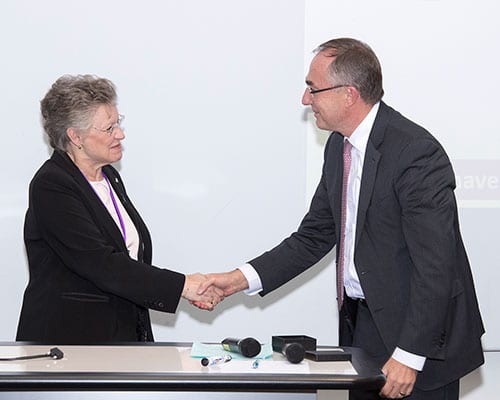UCL Prize Lecture in Clinical Science
By ucyow3c, on 28 October 2016
Written by UCL MBPhD student Callum Donaldson
Professor François Barré-Sinoussi was the well-deserved recipient of this year’s UCL Clinical Prize Lecture award.
In 1966, Professor Barré-Sinoussi began her undergraduate studies in Natural Sciences at the University of Paris. Following this, she undertook a PhD project with Jean-Claude Chermann at the Pasteur Institute, studying a retrovirus capable of inducing leukaemia in mice.
After obtaining her PhD in 1974, Professor Barré-Sinoussi decided to travel to the United States to begin a post-doctoral fellowship with Bob Bassin at the NIH. The main aim of the project was to identify the viral target of murine leukaemia virus (MLV) restriction factor Fv1.
After a year at the NIH, Professor Barré-Sinoussi returned to Paris to continue investigating the relationship between retroviruses and cancer.
In the early 1980s clinicians were faced with the emergence of a frightening new epidemic, now known as AIDS. Perplexed clinicians in Paris contacted virologists at the Pasteur Institute asking them for their assistance in identifying the responsible pathogen.
A hallmark of retroviruses is their ability to reverse transcribe their RNA genomes in to DNA by the action of the viral enzyme reverse transcriptase. By measuring reverse transcriptase activity in a lymph node biopsy from a patient suffering from this illness, Professor Barré-Sinoussi showed that a retrovirus was responsible. For her crucial role in the discovery of HIV, Professor Barré-Sinoussi deservedly shared the 2008 Nobel Prize in Medicine or Physiology.
Professor Barré-Sinoussi’s lecture was highly informative, comprising a concise overview of the history of HIV and the current advances being made.
It is difficult to overestimate the impact that Professor Barré-Sinoussi has had on the HIV/AIDS field. The discovery of HIV as the causative agent of AIDS in 1983 led to rapid advances in our understanding of this deadly pathogen.
In 1987, the first antiretroviral drug for treatment of HIV, zidovudine (AZT), was approved by the FDA. Since then, the treatment of HIV has changed drastically with significant improvements in life expectancy and quality of life.
The ambitious multinational ‘Fast-Track’ project hopes to end the AIDS epidemic by 2030. The ‘90-90-90’ target, a cornerstone of this project, aims to ensure that 90% of people living with HIV have been diagnosed, with 90% of those diagnosed on medical treatment and 90% of those on medical treatment having efficient viral suppression.
Professor Barré-Sinoussi is a passionate advocate of ending the HIV epidemic and is involved in many HIV/AIDS organisations.
The current treatments available result in suppression of the virus rather than its elimination.
Following infection, HIV establishes a latent reservoir in various cells throughout the body. In order to cure a patient, these latent reservoirs need to be eradicated.
Despite the success of current antiretroviral strategies, Professor Barré-Sinoussi stressed the importance of continuing to strive for a complete HIV cure.
During the lecture, she gave some fascinating insights in to some of the exciting avenues of current HIV research including: vaccines; latency reversing agents (LRAs) and gene/cell therapy techniques.
She also highlighted the vital importance of public health measures in combating the virus.
These include improving education for safe sexual practices and drug adherence, as well as reducing the stigma and discrimination associated with HIV infection.
A young group of enthusiastic MBPhD students had the honour of meeting Professor Barré-Sinoussi before the lecture.
She was very modest about her achievements and passionately expressed her desire to see the end of the AIDS epidemic. She stressed the importance of speaking to people living with HIV directly to understand their hopes and expectations.
In addition, she emphasised the importance of close relationships between scientists and clinicians so that clinical observations can help direct research.
Since her discovery of HIV in the early 1980s, Professor Barré-Sinoussi has remained a highly influential figure in improving our understanding of it. Today, she continues to promote political cooperation and international integration in combating HIV globally.
 Close
Close


